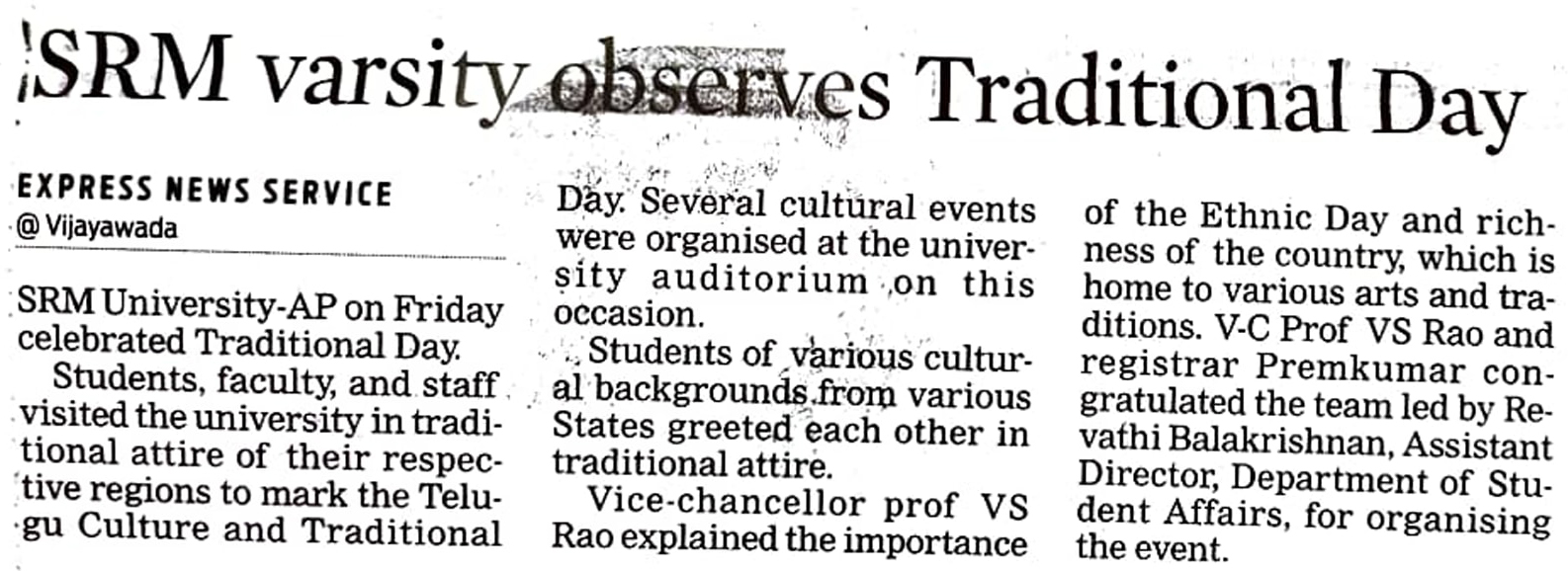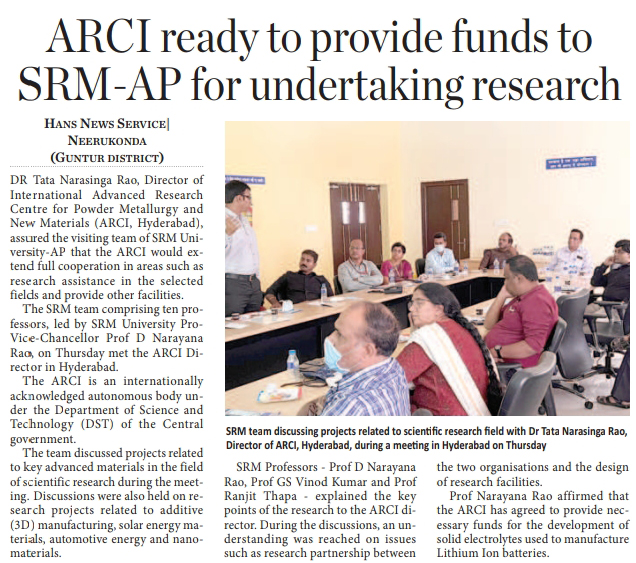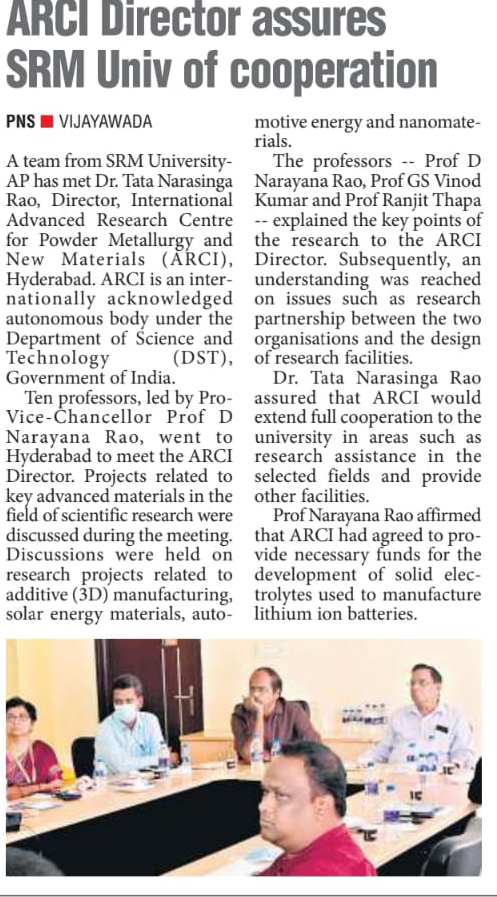All Management Events
- Ethnic Day celebrated at SRM-AP varsity May 5, 2022
- ARCI ready to provide funds to SRM-AP for undertaking research May 5, 2022
- SRM-AP V-C bags EduStar’s Most Impactful V-C award May 5, 2022
Telegraph – April 30
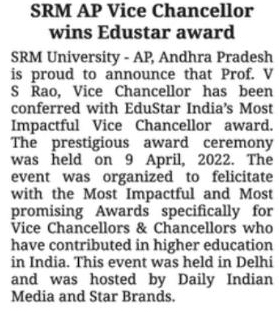
Financial Express – April 22
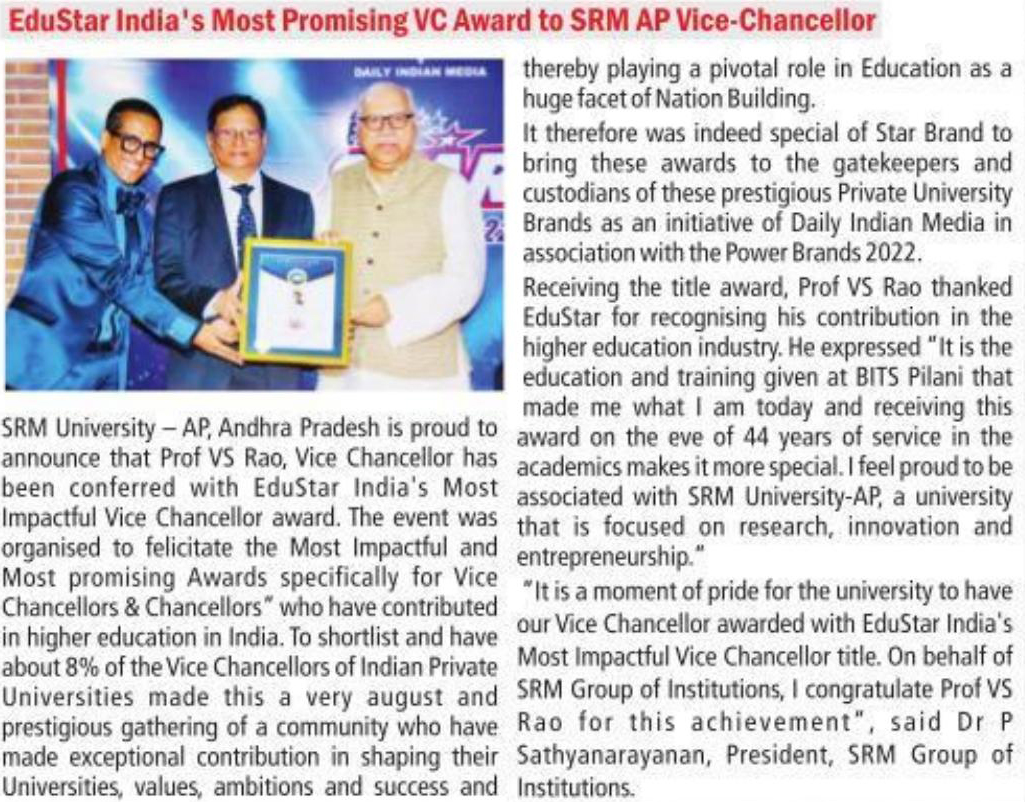
Indian Express – April 20
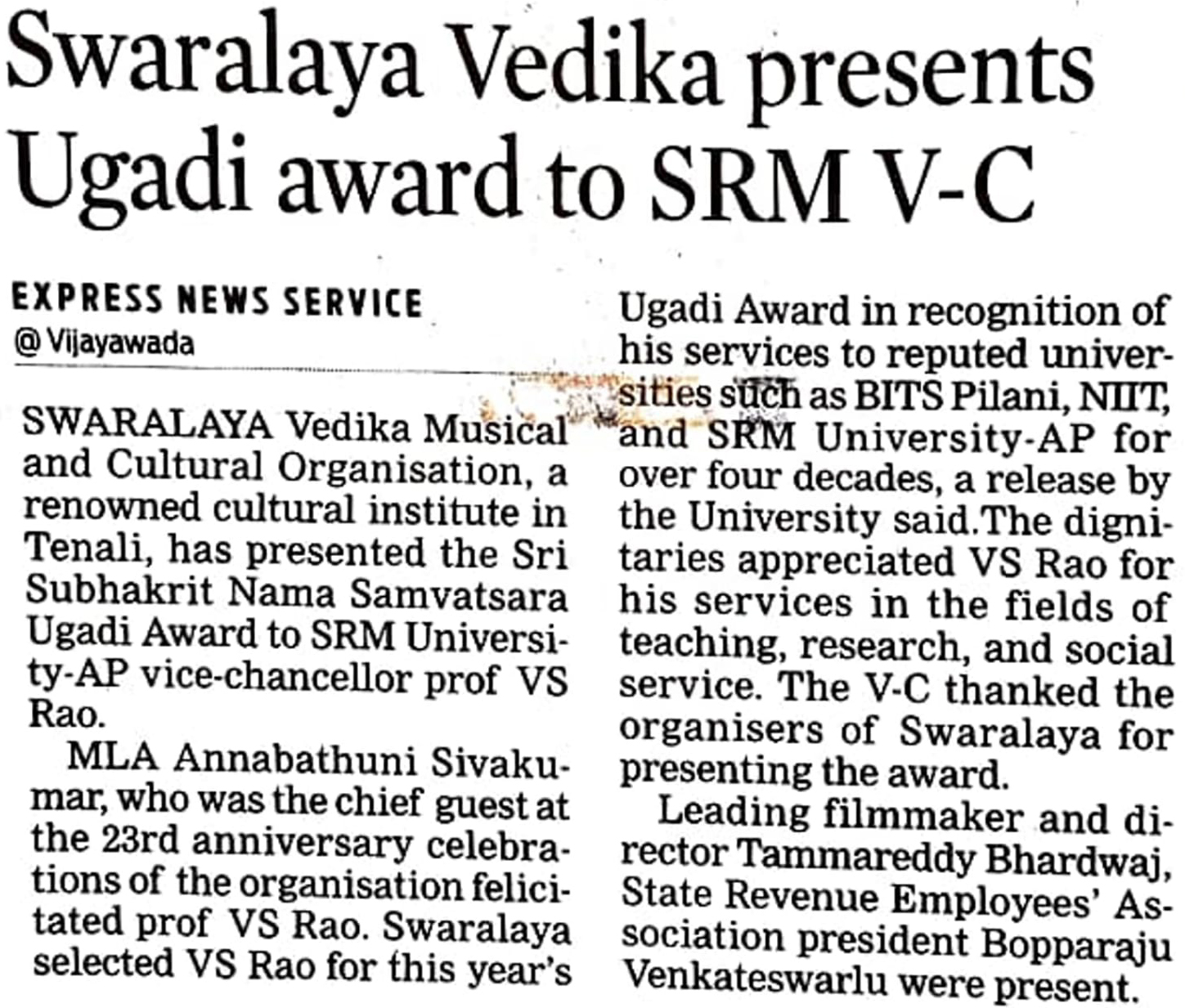
Indian Express – April 20
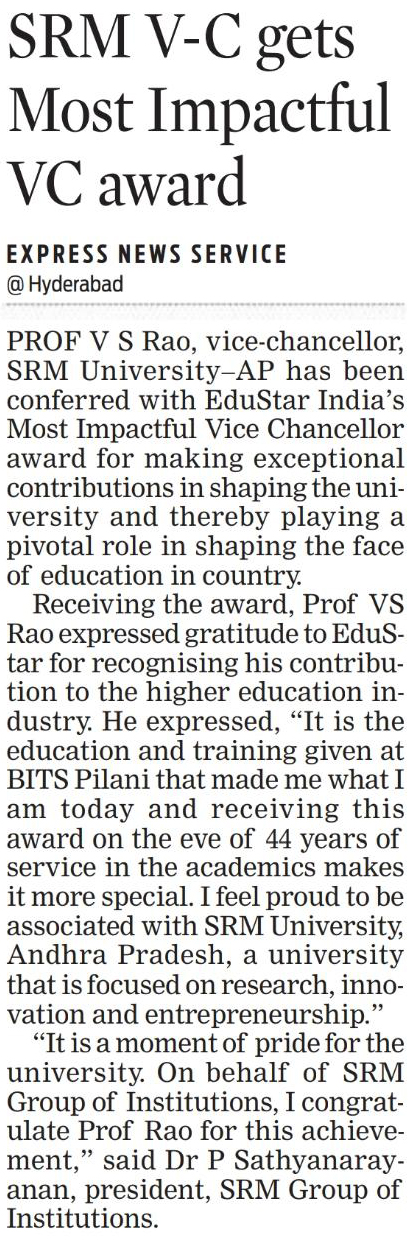
Hans India – April 10
Continue reading →
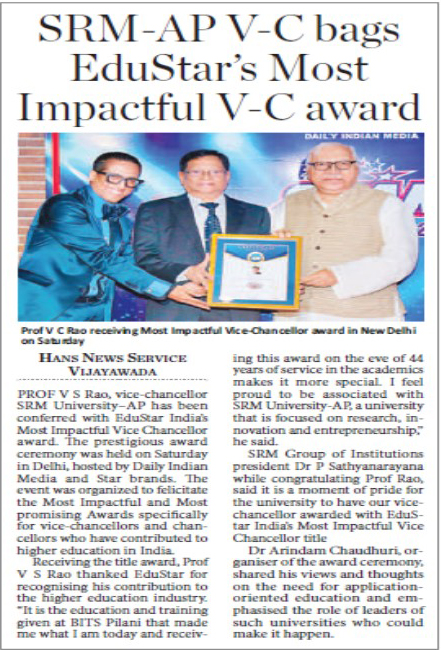
- Know your style of writing May 4, 2022
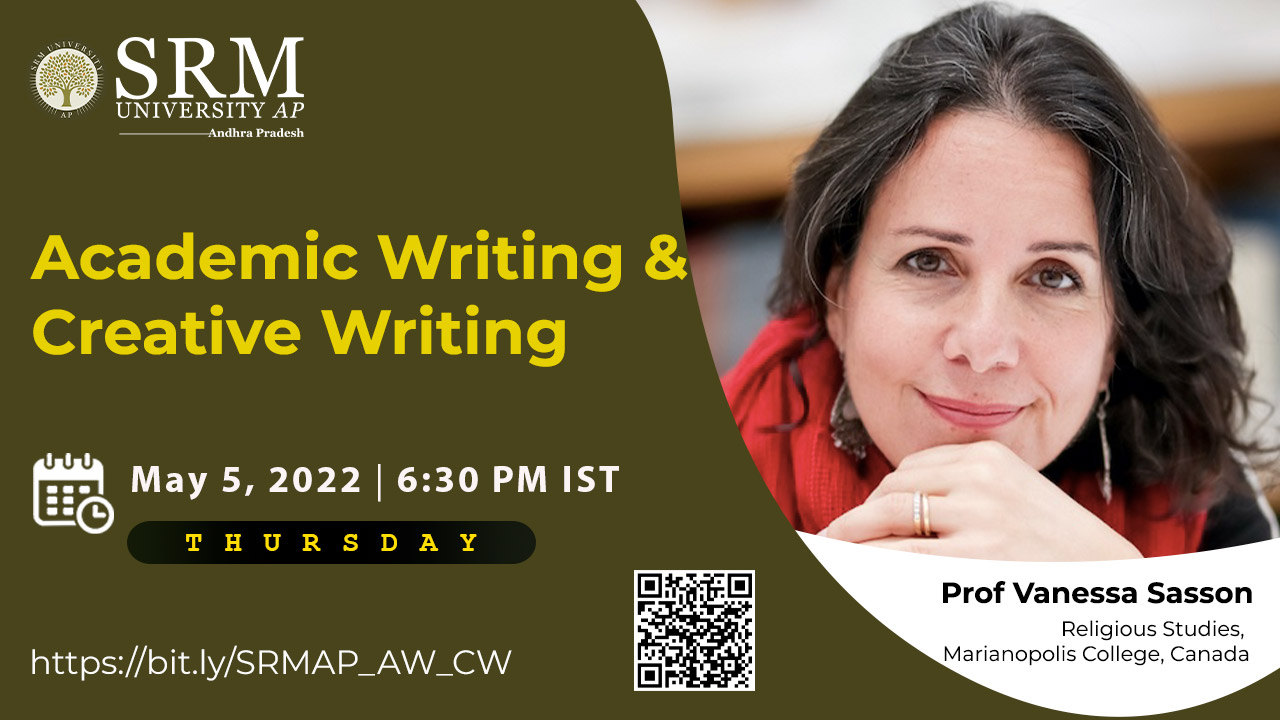
The art of writing can be branched out into different types depending upon the purpose of each piece of writing. You might have come across varied styles of writing such as creative writing, academic writing, technical writing and many more. Have you ever tried to deduce the difference between all these writing styles? Well, we offer you an informative session that will help you gather a better understanding of different styles of writing.
The Department of English has scheduled a webinar on the topic “Academic Writing & Creative Writing” under the theme “Language and Society” with Prof Vanessa Sasson as the keynote speaker.
Date: May 05, 2022
Time: 6.30 PM IST
Academic writing and creative writing seem to be pulling the act of writing and the writers in two different directions. A lot of writers, especially aspiring writers, tend to think of both genres as catering to very different audiences and fulfilling very different needs in very different contexts. Does that mean you can be only one and not the other? Do you have to choose? And how do you decide what to commit to? In this talk, Prof Vanessa Sasson will share her experience of writing in both capacities and discuss the joys and challenges of both.
About the Speaker
Vanessa R Sasson is a professor of Religious Studies in the Liberal Arts Department of Marianopolis College where she has been teaching since 1999. She is also a Research Fellow at the University of the Free State and a Research Member for CERIAS at UQAM. She has published widely as a scholar, with a number of academic books to her credit. Her most recent book was published by the University of Hawaii Press (2021) and is entitled, Jewels, Jewelry, and Other Shiny Things in the Buddhist Imaginary. Yasodhara and the Buddha (Bloomsbury, 2021) is her first novel. She is currently completing the sequel.
Join the Webinar to master the art of writing!
Continue reading → - Launching antenna-multiplexer for seamless IoMT connectivity May 2, 2022
Dr Divya Chaturvedi, Assistant Professor, Department of Electronics and Communication Engineering, has come up with an exciting proposal for enhanced connectivity and high-speed data transmission across the Internet of Medical Things (IoMT) devices. Her research paper titled “Design of Antenna-Multiplexer for Seamless On-Body Internet of Medical Things (IoMT) Connectivity” has been published in the journal ‘IEEE Transactions on Circuits and Systems II: Express Briefs’, having an impact factor of 3.71. It was published in collaboration with Dr Arvind Kumar from Vellore Institute of Technology and Dr Imaculate Rosaline from Ramaiah Institute of Technology, Bangalore.
The research looks into the design and development of a multi-band self-triplexing antenna for Medical Things (IoMT) applications. The antenna is designed to operate at 5.2, 5.5 and 5.8 GHz and self-isolation is achieved below -23.9 dB. It also offers seamless communication links to other devices operating at the same frequencies. The designed antenna is cost-effective and compact in size, that can easily fit into any implantable medical device. To avoid the harmful effect of radiation, the SAR value should be <1.6 W/kg. The SAR for this antenna is achieved at 0.362 W/kg in a very simple profile. Due to its compact size, the antenna can be easily mounted in a wireless portable device. The self- triplexing property of the device also enables full-duplex communication between different devices in a single antenna. This design suggestively simplifies the density of the RF front-end subsystem and leads to a simple and efficient communication system.
Abstract of the Research
Here, a compact design of antenna-multiplexer is engineered specifically to meet the stringent requirement imposed by intricate subsystems operating at 5.2, 5.5, and 5.8 GHz frequency bands for Internet of Medical Things (IoMT) applications. The proposed design includes a hexagonal-shaped substrate integrated waveguide (HSIW) cavity, tripole-shaped radiating slot, tuning vias, and three inset microstrip feedlines. A tripole-shaped slot is imprinted on the top of the SIW. This slot subdivides the cavity into trio-radiating segments and each segment offers a single frequency band. Further, the frequency bands are tuned at 5.2/5.5/5.8 GHz. The design maintains mutual port isolation better than 23.9 dB. Compared with the conventional tri-frequency antennas, the proposed design is highly compact and doesn’t need any additional circuitry to improve the port isolations. The measured results confirm the expected performance of the design. Furthermore, the proposed antenna is optimized within an implantable medical device (IMD) and simulated inside a realistic Human Head model at a depth of 3 mm and the Specific Absorption Rate (SAR) value is estimated. The SAR values are well below 0.362 W/Kg at the functioning bands due to the unidirectional radiation pattern from the antenna.
Her future research plan includes designing and developing a cost-effective bra-like prototype of Antenna-Array Sensors for breast cancer detection.
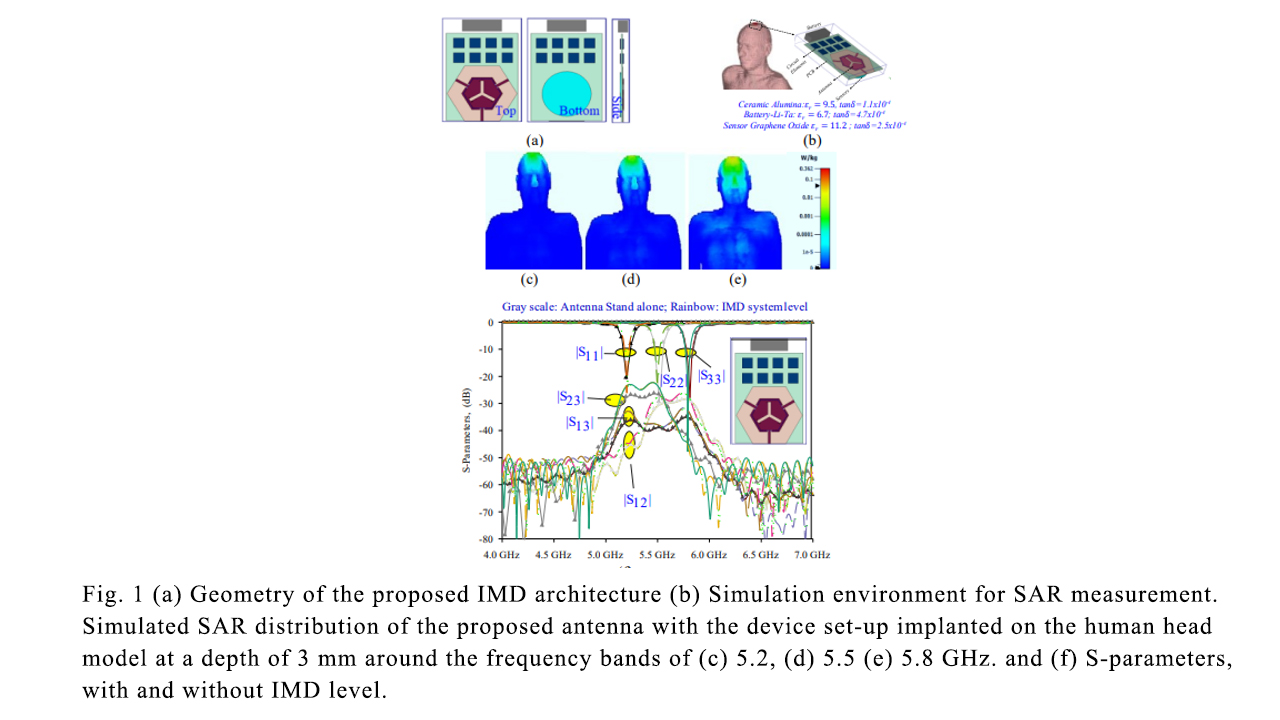
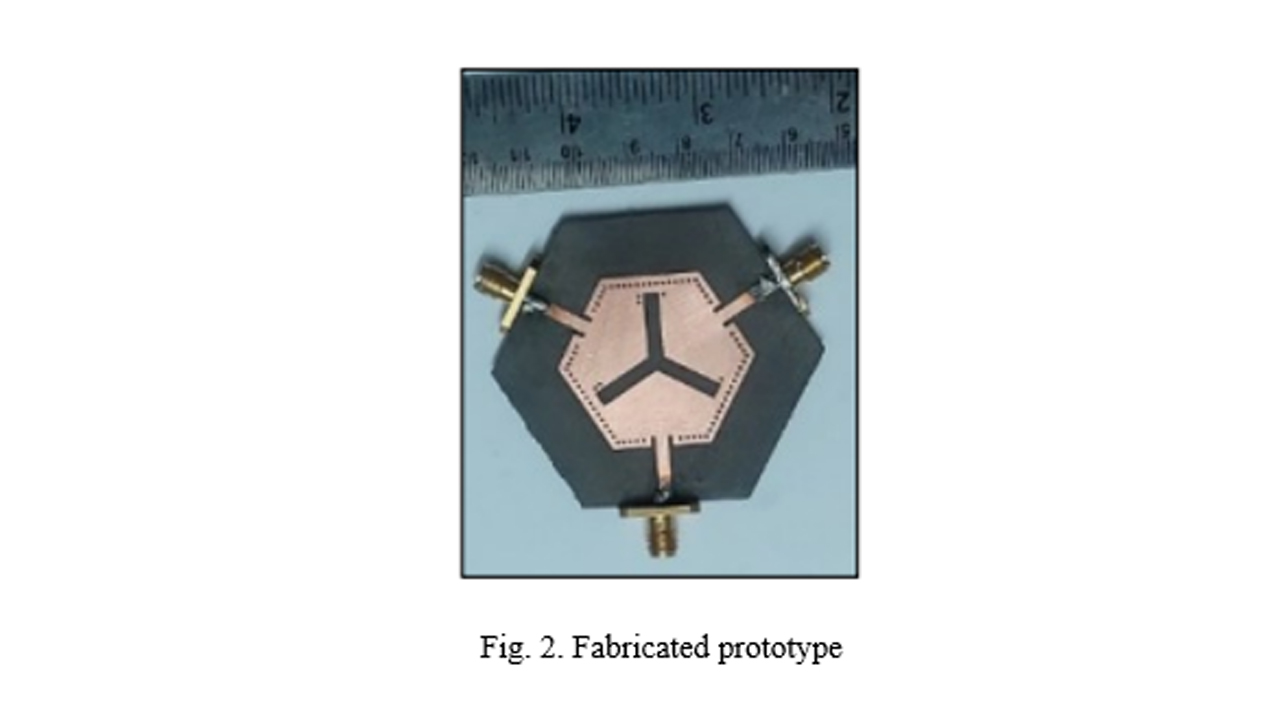
- Paridhaan: Celebrating the myriad hues of India May 2, 2022
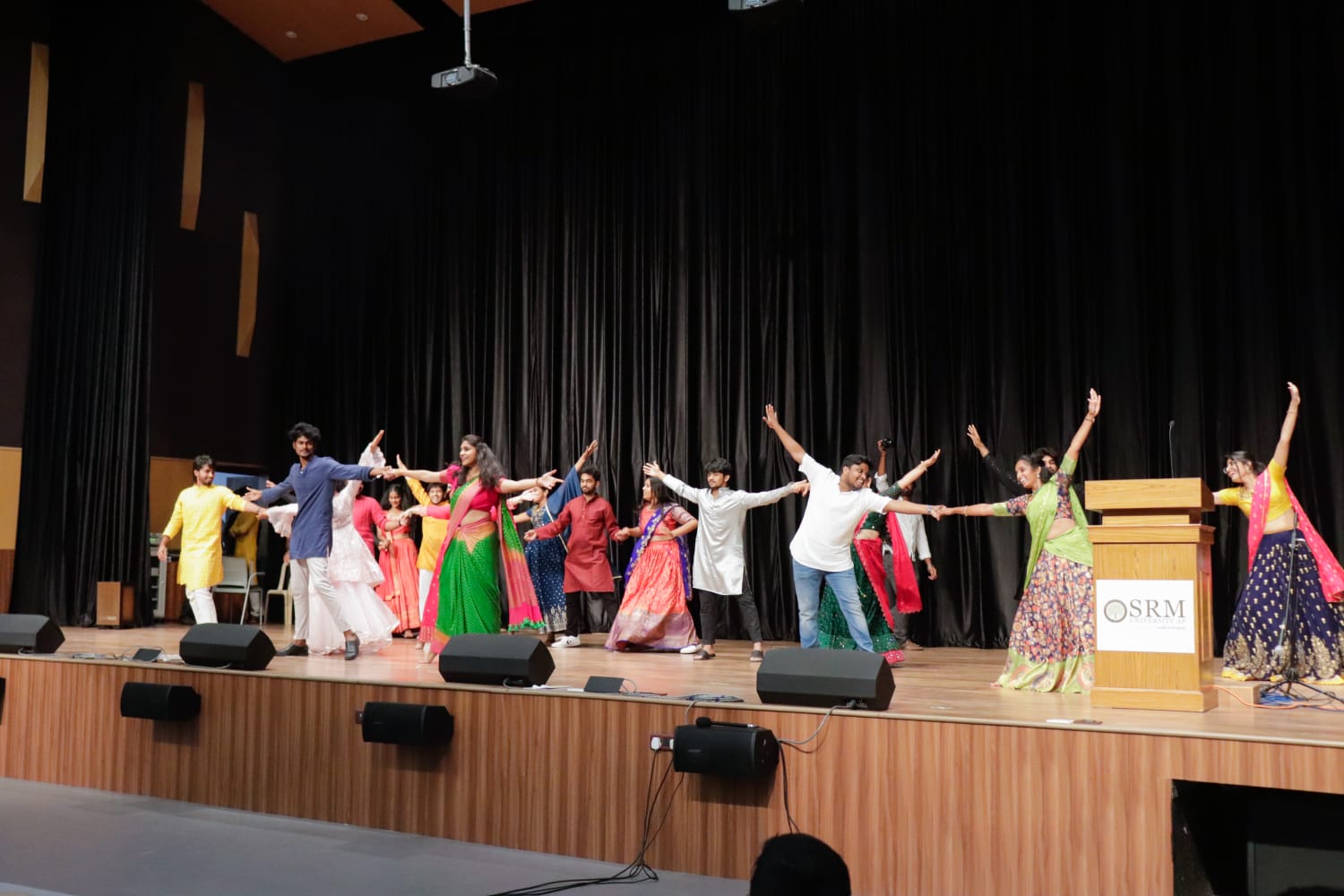
“India is the One land that all men desire to see and having seen once, by even a glimpse, would not give that glimpse for all the shows of all the rest of the globe combined” – Mark Twain
His words express the wonder of experiencing the myriad shades of culture thriving on the Indian landscape. Celebrations marking the beauty of our enriching tradition are indeed reminders of the boundless diversity of this country. An ethnic day is an occasion to look back and marvel at the greatness of Indian civilization. It endows us with an opportunity to embrace and rejoice in the shimmering diversity of our motherland. Such good times are meant to be cherished forever as it ties together the manifold differences our people foster.
The Department of Student Affairs proudly organised ‘Paridhaan’, an Ethnic-Cultural event for celebrating the rich Indian heritage. Students came decked up parading the exquisite fashion culture existing across different parts of the nation. The day was brimming with high-sprits and festivity as students from different parts of the country came attired in their traditional outfits flaunting their cultural legacy. An array of dance and musical performances was organised for students to put their talent and vigour on display.
There were programmes ranging from solo musical performances to dance medleys and fashion shows. The stage was set on fire with a live opera performance of Sanjana, who mesmerised the crowd with her mellifluous voice. Equally stunning was the musical entertainment of Amrit who weaved magic with his Santoor, playing the Hamsadhwani raga. Each performer enthralled the audience with different musical stylings, such as mashups, raps and so on. The crowd was also clamouring with joy at the rocking dance performances by the students of the dance club.
The major highlight of the day was the fashion show. The participants adorned the stage with ravishing ethnic outfits representing their cultural distinctiveness. There were portrayals of different dressing styles of India as well as countries like China and Africa. Donning the garbs of different regions from Assam to Gujarat and Kerala, even dating back to the times of the Mughal Era, the show dazzled the crowd with enchanting hues. The celebrations came to a closure with a few more delightful performances. All the SRM dignitaries including the Vice-Chancellor, Prof V S Rao, took part in the celebrations and congratulated the students for making the event a huge success.
Continue reading → - Paridhaan: A celebration of colourful diversities April 29, 2022
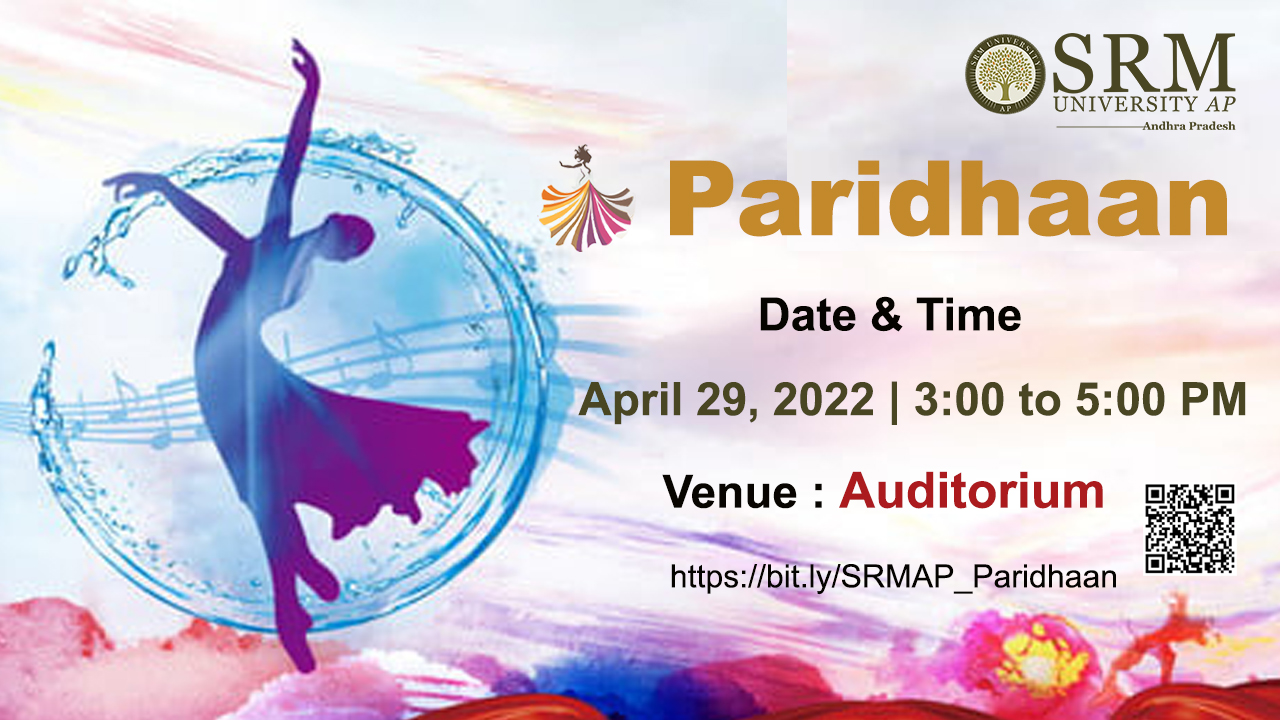
Do you wish to take a breather and forget all your worries? How about spending some time singing and dancing with your friends? Spending some time beyond classes, exams, and labs is very much an essentiality in every student’s life. Imparting well-rounded education also includes giving students a platform to flaunt their creative spirits.
The Department of Student Affairs is organising Paridhaan, an ethnic-cultural event for our students to come together and celebrate amidst their busy schedules.
Date: April 29, 2022
Time: 3.00 pm to 5.00 pm
Venue: Auditorium
This is an occasion for all enthusiastic and motivated young talents to showcase their skills. The celebration is also a reflection of the colourful diversity of our country. It gives an opportunity for students from diverse backgrounds to embrace one another’s cultural heterogeneity.
Mark your presence and spread out the sizzle.
Continue reading → - Let your resume speak for yourself April 29, 2022
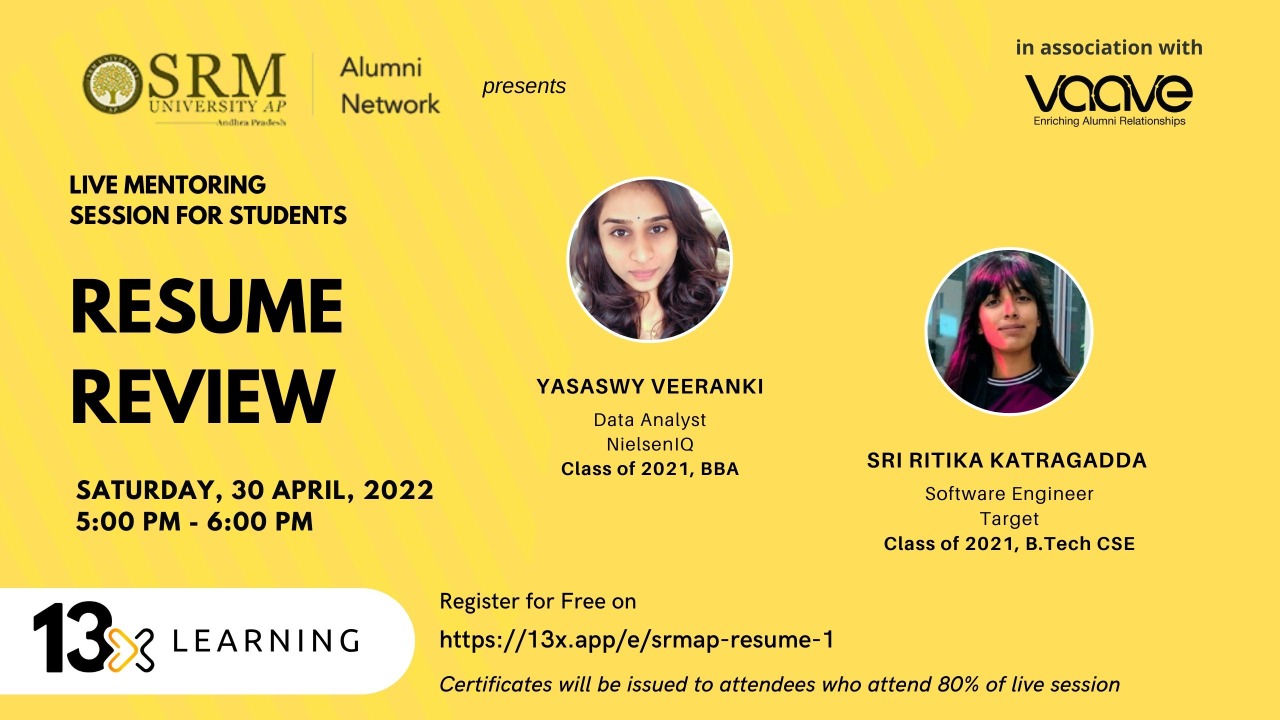 A resume comes across the recruiter or employer way before you. It single-handedly opens the door to a world of opportunities. Making yourself visible in the crowd of applicants is a craft of intelligence. Your resume should portray the most refined version of yourself in a strictly competent world. Reviewing your resume is advantageous since the reviewer evaluates from an employer’s perspective.
A resume comes across the recruiter or employer way before you. It single-handedly opens the door to a world of opportunities. Making yourself visible in the crowd of applicants is a craft of intelligence. Your resume should portray the most refined version of yourself in a strictly competent world. Reviewing your resume is advantageous since the reviewer evaluates from an employer’s perspective.The Directorate of Alumni Affairs has planned to start Live Mentoring Programs by SRM-AP Alumni from different domains. The first mentoring session, Resume review, is scheduled to be organised this Saturday through zoom. Students can share their updated resumes with the mentors during the session to get practical input from them.
Date: April 30, 2022
Time: 5.00 pm to 6.00 pm IST
Be ready with your updated resume and join the mentoring session.
Continue reading → - Action plan for a career beyond the boundaries April 27, 2022
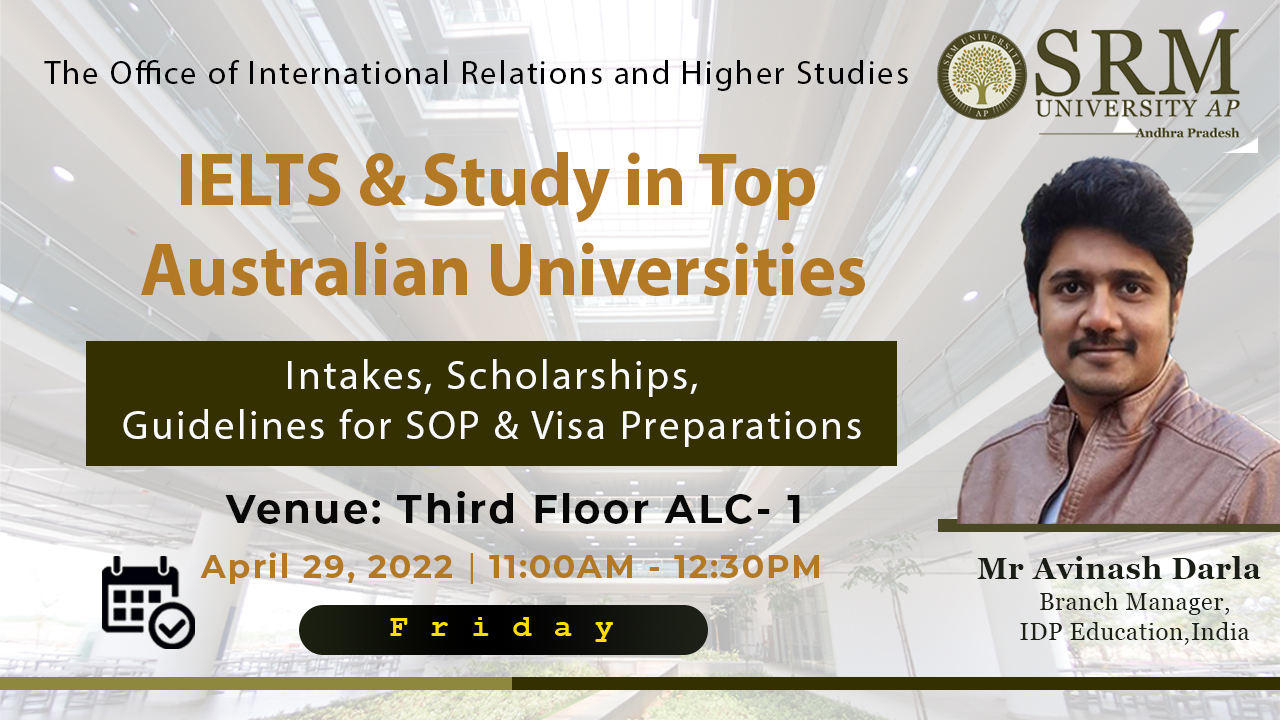 Preferring to pursue a career abroad is a huge decision. Choosing the appropriate country and institution to study makes your decision worthwhile. Clearing an English Language Proficiency Test is the foremost step in this process. Then comes the struggle of finding a country compatible with you. Australian universities have always been an option for students who aspire to study abroad. This diverse country offers a wide range of opportunities for international students. A precise understanding of IELTS, the best universities, and scholarships will expedite the journey towards the higher studies you dreamed of.
Preferring to pursue a career abroad is a huge decision. Choosing the appropriate country and institution to study makes your decision worthwhile. Clearing an English Language Proficiency Test is the foremost step in this process. Then comes the struggle of finding a country compatible with you. Australian universities have always been an option for students who aspire to study abroad. This diverse country offers a wide range of opportunities for international students. A precise understanding of IELTS, the best universities, and scholarships will expedite the journey towards the higher studies you dreamed of.The Office of International Relations and Higher Studies is organising a lecture on ‘IELTS & Study in Top Australian Universities – Intakes – Scholarships – Guidelines for SOP & Visa Preparations’ as part of their Higher Studies lecture series. The lecture intends to provide a profound knowledge regarding the advantages of studying at top Australian Universities, details of scholarships, things to know before applying, etc.
Date: April 29, 2022
Time: 11.00 am to 12.30 pm IST
Venue: Third Floor ALC-1
About the speaker
Mr Avinash Darla is the Branch Manager of IDP Education, India. He has 11+ years of experience in the education industry- Training, Overseas & Domestic education. He has served as the Business Head of Abroad Avenue, Branch Manager of Akash Education Pvt Ltd, State Head of Fliplearn Education India, etc. He has also received multiple certifications from esteemed organisations like Qualified Education Agent Certification- PIER International, Australia; Study & Live in UK Certification- British Council & Future Learn; Business Strategies Education & Development- University of Hertfordshire, UK, and many more.
Join the session to know more about the opportunities waiting for you abroad.
Continue reading → - Demystifying the essence of yoga April 27, 2022
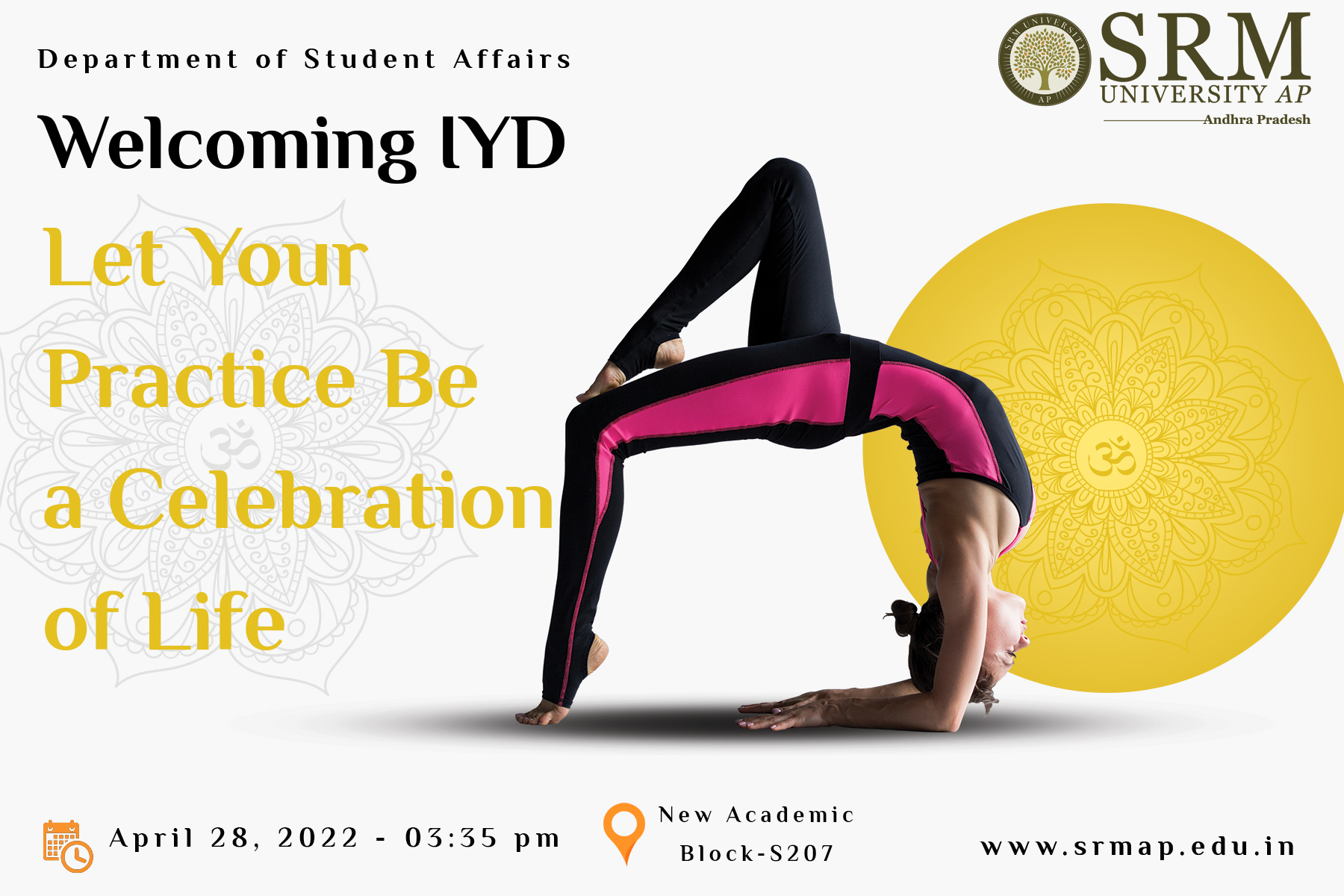
“Yoga is the practice of tolerating the consequences of being yourself” – Bhagavad Gita
Have you ever tried to demystify the meaning of yoga? Yoga, sometimes undefinable, is a multifaceted term having several layers of meaning embedded into it. For some, it’s a form of exercise. For some others, yoga is a religion or a philosophy. And you may have also come across the perception deduced by many that yoga is just a way of life. So, what exactly is yoga? How do you give it an all-encompassing definition?
The term yoga literally means “union”. It is the coming together of body, mind, emotions, and energy to render you the complete experience of being you. It takes one on the transcendental journey to explore one’s true self. It also anchors as an ultimate solution to all the sufferings and woes that weigh you down.
The Department of Student Affairs is hosting a series of events marking the arrival of International Yoga Day, 2022. As part of the series, a yoga session has been organised to walk our students through the enchanting exercise of knowing thyself.
Date: April 28, 2022
Time: 3.35 pm
Venue: New Academic Block- S207
We invite all our students to take this infant stride into a bigger journey of discovering the inner self.
Continue reading →



